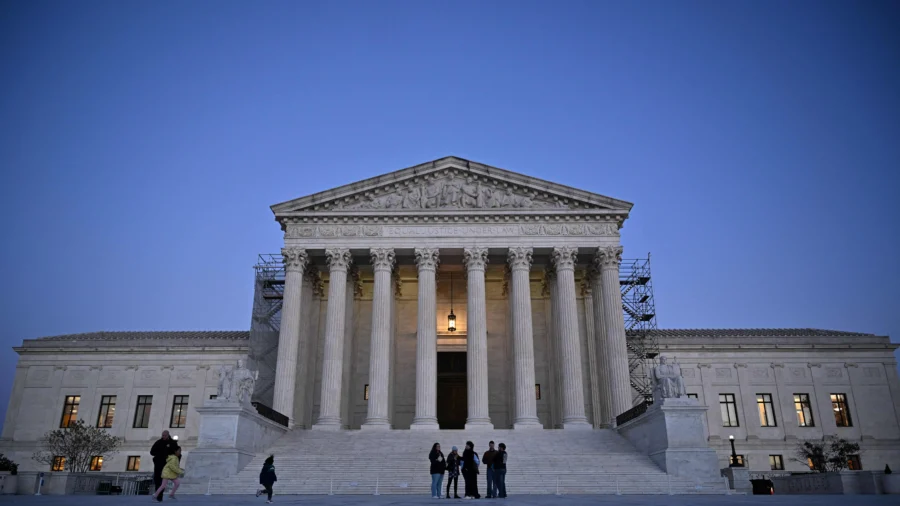The Supreme Court may soon consider whether honking a car horn is a constitutionally protected form of free speech.
Although Americans have long sounded the horns of their vehicles to express themselves politically, many states, including California, forbid honking the horn on one’s automobile except to warn of a safety hazard. Officials say hitting the horn excessively dilutes the effectiveness of honking as a means of signaling danger or facilitating the flow of traffic.
The justices are scheduled to consider the case, known as Porter v. Martinez (court file 23-423), at their private conference on Dec. 1.
The case will move forward to the oral argument stage if at least four of the nine justices vote to grant the petition for certiorari, or review. The justices could make this decision on Dec. 1, or they could leave it for a subsequent private conference.
Drivers honked their horns during the 2020 election cycle, an act that both President Joe Biden and President Donald Trump “have recognized … as a form of political expression,” the petition filed with the court states.
“The car horn is the sound of democracy in action,” the petition says.
At a drive-in rally, President Biden, then a candidate, urged his supporters to “honk if you want America to lead again. Honk if you want America to trust each other again. Honk if you want to be united again.”
In May 2020, a convoy of truckers honked their horns to protest the government’s trade policies, and in the process interrupted a speech President Trump was delivering in the Rose Garden of the White House. President Trump called out to the truckers, saying they “were with [him] all the way,” and that the honking was “a sign of love.”
Since the beginning of the twentieth century, “Americans of all political persuasions have honked their cars’ horns to express their support or displeasure and add their voice to the political and civic dialogue of this country. Every day across this country, motorists use their vehicles’ horns to express themselves when passing roadside picket lines, demonstrations, and protests,” according to the petition.
The case goes back to Oct. 17, 2017, when petitioner Susan Porter of Oceanside, California, honked her horn 14 times to show support for people who were protesting Rep. Darrell Issa (R-Calif.) for his support of President Donald Trump.
Coincidentally, Mr. Issa co-founded Directed Electronics, which makes automobile security systems. Many car alarms signal an attempted break-in by causing the vehicle to honk.
Ms. Porter was ticketed by a San Diego County sheriff’s deputy for violating a state law about misusing car horns.
Section 27001 of the California Vehicle Code states: “The driver of a motor vehicle when reasonably necessary to insure safe operation shall give audible warning with his horn. … The horn shall not otherwise be used, except as a theft alarm system.”
She showed up for traffic court on Dec. 12, 2017, but the citation was dismissed because the issuing sheriff’s deputy failed to appear. Despite that, she sued in federal court in mid-2018, arguing that the California law violated the First Amendment to the U.S. Constitution.
Judge Gonzalo Curiel of the U.S. District Court for the Southern District of California ruled against Ms. Porter on Feb. 5, 2021. Judge Curiel was appointed by President Barack Obama in 2012.
The judge found that the state law passed constitutional muster and was “an appropriate regulation on the time, place, or manner of the protected speech and expression … [and was] narrowly tailored to serve a significant government interest, namely traffic safety and noise pollution.”
The law, he added, “leaves open ample alternative channels for communication.”
A divided U.S. Court of Appeals for the 9th Circuit upheld the lower court’s ruling.
Circuit Judge Marsha Berzon, who was appointed in 2000 by President Bill Clinton, dissented.
She wrote that “there is no evidence in the record (or elsewhere, as far as I can determine) that such political expressive horn use jeopardizes traffic safety or frustrates noise control.”
The state law “prohibits core expressive conduct, and is therefore unconstitutional in that respect.”
In her petition, Ms. Porter argued that the 9th Circuit majority erred.
“The Government primarily justified its law by reference to its interest in traffic safety. However, the Government admitted that it knows of not one accident caused or threatened by non-warning honking,” the petition states.
Although several courts of appeal “have struck down blanket bans on expressive conduct or speech on or near public roadways,” the 9th Circuit went in the opposite direction.
The Epoch Times reached out to Ms. Porter’s lead attorney, Thomas Burke of Davis Wright Tremaine in San Francisco, but had not received a reply as of press time.
But co-counsel David Loy of the San Rafael, California-based First Amendment Coalition, previously weighed in on the case.
Mr. Loy said he was “shocked that state law prohibits a common and widespread means of political, social, and personal expression.
“The government should not be stifling a critical form of expression, especially when public-health restrictions can curtail other means of assembly and protest, as we’ve sometimes seen during the COVID-19 pandemic.”
The Epoch Times also sought comment from attorney Jeffrey Michalowski of Quarles and Brady in San Francisco, who represents the respondent, San Diego County Sheriff Kelly Martinez, a Democrat, but had not received a response at the time of publication.
The California Department of Justice, which represents the respondent, the California Highway Patrol, declined to comment on the ongoing case.
The Epoch Times also asked the California Highway Patrol for comment but no reply had been received at press time.
From The Epoch Times


